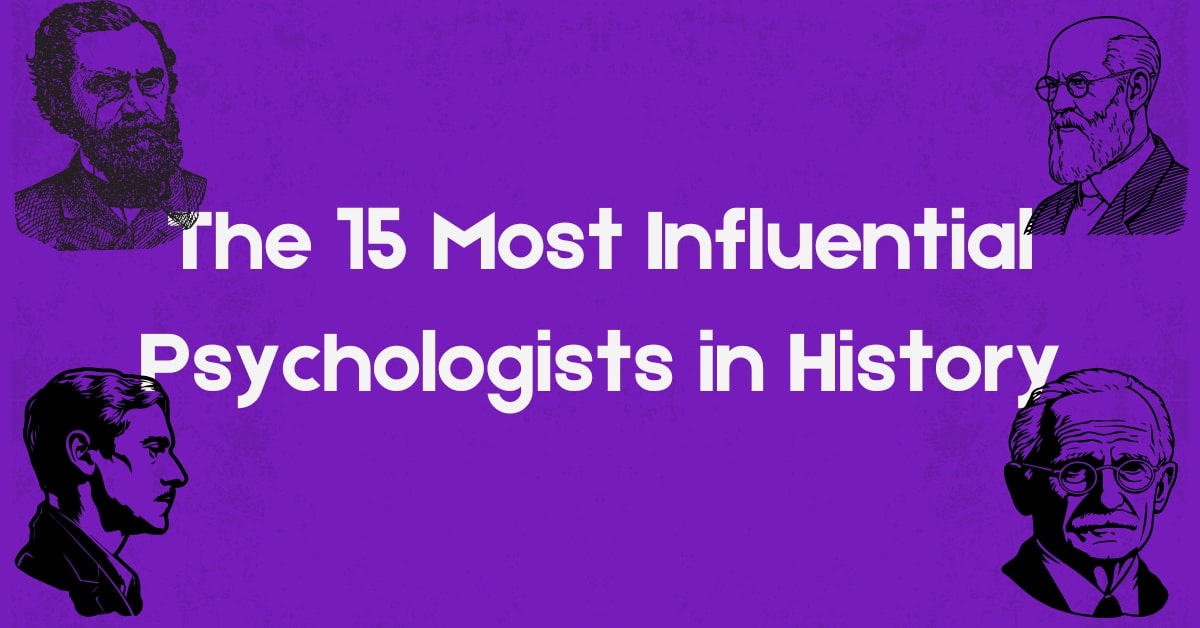Psychology is the study of the mind, and great thinkers over the centuries have influenced what we know about human behavior, feelings, and mental illness. From Freud’s discovery of the unconscious to Skinner’s behavior experiments, these psychologists revolutionized our perception of ourselves.
Why Psychology Matters More Than Ever
Today’s world of social media feeds and office stress, these psychologists’ concepts make sense of:
•Why you can’t stop scrolling (Skinner’s variable rewards)
•How adult relationships are influenced by childhood (Bowlby’s attachment theory)
•Why false news travels (Festinger’s cognitive dissonance)
Their 100-year-old theories foretell contemporary behaviors with chilling precision – demonstrating great psychology is ageless.
Here in this blog, we will learn about the 15 most influential psychologists in history, their revolutionary ideas, and how they continue to influence our lives today. Whether you’re a student, a curious thinker, or just someone who loves to learn about people, this list will take you on a fascinating journey through the minds of the great psychology thinkers.
1. Sigmund Freud (1856–1939) – The Father of Psychoanalysis

Freud is arguably the most well-known psychologist—and most contentious. He came up with the concept of the unconscious mind, where our secret desires and memories drive us.
Cool fact: Freud’s iconic couch wasn’t for relaxation alone—he used it to get patients to unwind so they’d talk openly. He was also a cigar aficionado (smoking 20 a day!) and thought they helped him think. Although his psychosexual stage theories are controversial now, his belief that childhood determines adulthood remains central in therapy.
Modern Impact:
Ever blamed your “daddy issues” on Freud? You’re not wrong! Phrases like “Freudian slip” (accidentally revealing hidden thoughts) and “Oedipus complex” are now part of everyday language. Even shows like The Sopranos use Freudian therapy scenes!
Key Idea: Psychoanalysis (talking therapy to uncover repressed thoughts).
Famous Ideas: Id, Ego, Superego; Oedipus Complex; Dream Interpretation.
Influence Now: Despite controversy about some of his ideas, Freud’s impact can be found everywhere—therapy, film, and the way we speak about child experience.
We have, on psychologus, used psychoanalysis through an interdisciplinary perspective.
2. Carl Jung (1875–1961) – The Pioneer of the Collective Unconscious

Jung was a student of Freud but went on to formulate his own ideas. He postulated a collective unconscious—universal human impulses and symbols (archetypes) such as the Hero, the Shadow, and the Wise Old Man.
Key Idea: Personality types (Introvert vs. Extrovert).
Famous Concepts: Archetypes, Synchronicity, Individuation.
Impact Today: Myers-Briggs personality tests (derived from Jung’s work) are still used extensively in the workplace and self-help.
3. B.F. Skinner (1904–1990) – The Behaviorist Who Shaped Learning

Skinner thought behavior was shaped by rewards and punishment (not hidden thoughts). His legendary Skinner Box demonstrated how animals (and people) learn by skinner’s ideas are everywhere:
- TikTok’s algorithm? Straight-up operant conditioning—you scroll on hoping for random rewards (viral videos).
- Gamification: Fitness apps (such as Duolingo) utilize streaks and badges to get you addicted.
- Parenting hack: Instead of yelling “Stop shouting!”, try “I love how quietly you’re playing!” (positive reinforcement).nces.
Key Idea: Operant Conditioning (reinforcement & punishment).
Famous Experiment: Pigeons trained to play ping-pong using rewards.
Impact Today: Used in education (reward systems), parenting, and even app design (think social media likes!).
4. Jean Piaget (1896–1980) – The Child Development Genius

Piaget observed children’s thinking as different from that of adults. Piaget learned that children progress through stages of cognitive growth (such as object permanence as infants).
Deeper Dive on Piaget
Mind-Blowing Piaget Fact:
He found kids’ logic isn’t “wrong” – it’s just alternative. When children claim that the moon is behind them, they aren’t speaking poetically; they truly believe it because of egocentrism (lack of ability to understand other people’s perspectives). Contemporary apps such as Khan Academy apply his stages to create lessons suitable for children’s ages.
Key Idea: Kids build knowledge based on experience.
Citation Famous Concept: Schema (mental structures for comprehending the world).
Impact Today: Modern education is based on his ideas (active learning, not just memorizing).
5. Abraham Maslow (1908–1970) – The Man Behind the “Hierarchy of Needs“

Maslow thought people are driven by needs, beginning with basic survival (food, safety) and progressing to self-actualization (realizing potential).
Key Idea: Humanistic psychology (not merely illness, but growth.).
Classic Pyramid: Physiological → Safety → Love → Esteem → Self-Actualization.
Influence Today: Applied in business (worker motivation), therapy, and self-help.
Modern Maslow
21st Century Update:
Maslow’s pyramid now has WiFi as a fundamental need! Researchers discovered internet connectivity is as important as housing for mental well-being (Journal of Applied Psychology, 2022). His hierarchy also accounts for:
•Why remote workers require virtual “love/belonging”
•Why Gen Z values self-actualization over job security
6. Carl Rogers (1902–1987) – The Founder of Person-Centered Therapy

Rogers trusted people have a self-motivating tendency to become better and cure themselves as long as the circumstances are ideal—empathy, genuineness, and unconditional positive regard.
Central Thought: There ought to be client-centered therapy free from criticism and judgment.
Classic Quote: “The curious paradox is that when I accept myself just as I am, then I can change.”
Legacy Now: Current coaching and counseling implement his process.
7. Ivan Pavlov (1849–1936) – The Dog Salivation Experiment Fellow

Pavlov invented classical conditioning—how we come to connect things (such as a bell and food, and dogs salivating when they hear the bell).
Key Idea: Reflexes can be conditioned (Pavlovian response).
Famous Experiment: Salivating dogs at a bell.
Influence Today: Applied in treating phobias, advertising, and developing habits.
8. Albert Bandura (1925–2021) – The “Bobo Doll” Psychologist

Bandura demonstrated we learn through observation (social learning theory). His Bobo doll experiment demonstrated children copying violent actions.
Key Concept: Observational learning (monkey see, monkey do).
Infamous Idea: Self-efficacy (conviction in being able to perform).
Influence Today: Helps shape education, parenting, and media influence (e.g., violent video game controversy).
9. Erik Erikson (1902–1994) – The Psychosocial Stages Theorist

Erikson built on Freud’s theory by stating personality grows throughout life in 8 psychosocial stages (such as “Trust vs. Mistrust” during infancy or “Identity vs. Role Confusion” during adolescence).
Key Idea: Development throughout life (not only childhood).
Famous Concept: Identity Crisis (adolescent struggle for self).
Impact Today: Applied in education, career guidance, and explaining midlife crises.
10. Lev Vygotsky (1896–1934) – The Social Development Theorist

Vygotsky thought learning is social—children learn best with support (teachers, peers) in the Zone of Proximal Development (ZPD).
Key Idea: Collaborative learning (scaffolding).
Famous Quote: “Through others, we become ourselves.”
Impact Today: Contemporary teaching techniques (group work, mentoring).
11. Wilhelm Wundt (1832–1920) – The Father of Experimental Psychology

Wundt established the first psychology lab in 1879, making psychology a science (not mere philosophy).
Key Idea: Introspection (examining conscious thoughts).
Famous Fact: First to refer to himself as a “psychologist.”
Impact Today: All contemporary psychology studies are based on his approach.
12. William James (1842–1910) – The Pragmatic Psychologist

James authored the first psychology textbook and emphasized how the mind works in everyday life (functionalism).
Key Idea: Stream of consciousness (thoughts are continuous).
Famous Book: The Principles of Psychology (1890).
Impact Today: Shaped contemporary cognitive psychology.
13. Anna Freud (1895–1982) – The Pioneer of Child Psychoanalysis

Freud’s daughter extended his research to kids, examining defense mechanisms (such as denial, repression).
Key Idea: Child psychology & developmental psychology.
Famous Concept: Defense Mechanisms.
Impact Today: School counseling and child psychology.
14. Stanley Milgram (1933–1984) – The Obedience Experiment Psychologist

Milgram shocked the world with his obedience experiments, demonstrating that people would hurt others if told to do so by an authority figure.
Key Idea: People obey authority, even contrary to morals.
Famous Experiment: “Teacher” delivering phony electric shocks.
Impact Today: Ethics of research, comprehending atrocities such as Nazi Germany.
15. Daniel Kahneman (1934–Present) – The Behavioral Economics Mastermind

Kahneman merged psychology and economics, demonstrating how people irrationally make choices (such as dreading losses more than enjoying gains).
Key Idea: Cognitive biases (System 1 & System 2 thinking).
Iconic Book: Thinking, Fast and Slow (2011).
Impact Today: Applied in marketing, finance, and policymaking.
Forgotten Pioneers
Underappreciated But Revolutionary:
•Mamie Phipps Clark (1917-1983): Her experiments with dolls showed segregation damaged the self-image of Black children, referenced in Brown v. Board of Education.
•Leta Hollingworth (1886-1939): Disproved men’s “truisms” about women’s “emotional instability” when menstruating.
•Muzafer Sherif (1906-1988): Demonstrated the development of conflicts between groups (aiding insight into contemporary political polarization).
These researchers altered the course of history but were airbrushed from textbooks – until now.
Did You Know?
Pavlov: His dogs didn’t only drool—some would sleep to the bell if conditioned with lullabies!
Jung: He used to have terrifying nightmares about zombies, which influenced his shadow theory.
Milgram: 65% of participants followed orders to administer “fatal” shocks—even while sweating and nervously laughing with stress.
Interactive Challenge
Psychologist or Instagram Quote?
Who said what:
1. “The unexamined life is not worth living”
a) Socrates b) Freud c) Your wellness influencer
2. “We are what we repeatedly do”
a) Aristotle b) Skinner c) A Pinterest poster
(Answers: 1a, 2a – proof that ancient insights get rebranded as new-age wisdom!)
Final Thoughts: Why These Psychologists Matter
These 15 thinkers didn’t just study the mind—they changed how we see ourselves. From Freud’s couch to Skinner’s pigeons, their ideas shape therapy, education, business, and even how we use social media.
Which psychologist’s research intrigues you the most? Let us know in the comments!
And if you liked this, pass it along to a friend who’s a people person—because psychology is all about people.
Keep thinking, keep growing!
A passionate psychologist on a mission to make psychology insightful, relatable, and engaging! From mental health to human behavior, I break down complex ideas into thought-provoking reads for curious minds.





